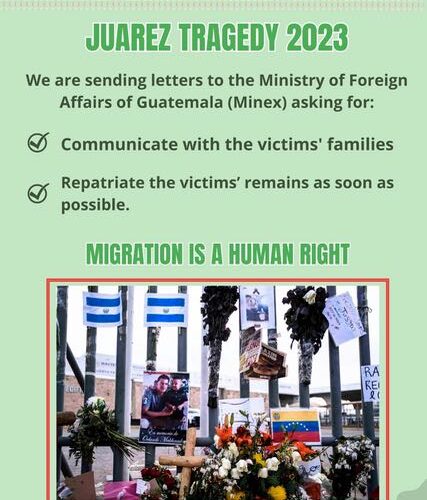| We at GHRC express our profound sadness at last week’s news of the tragedy in Ciudad Juarez, Mexico. On the night of March 27, 39 human beings perished in a fire inside a provisional detention center near the border between the US and Mexico. The detention center–run by the Mexican Federal Government’s National Migration Institute–held 68 migrants in a single cell locked from the outside. Video footage reveals that Mexican authorities failed to unlock the room when the fire broke out. As a result, 39 individuals lost their lives; sources later confirmed that most victims originated from Central America.
As we mourn this unnecessary loss of life, we cannot ignore the role of US immigration policy in giving rise to this tragedy. According to Mexican media reports, US authorities had expelled many of the migrants in the facility into Mexico under Title 42. A direct assault on the institution of asylum, Title 42 allows the US to expel migrants directly from the US border. Since January 2021, Human Rights First has documented over 1300 attacks against expelled migrants, including kidnappings, rape, and murder. Meanwhile, Mexican migration strategies responding to pressure from the US to stop migrants from reaching the Southern border rely increasingly on military enforcement and detention. Sadly, we’ve seen that a migration approach focused on restriction and deterrence leads to more violence against migrants, as evidenced by last week’s horrific incident.
The choice to leave everything behind and migrate is never an easy one. Still, in recent years, with expanding attacks on human rights defenders and the destruction of the rule of law in Guatemala, many are left without another option. A migration strategy must consider root causes that drive people from their homes, like expanding violence and dispossession of Indigenous communities. One of the victims–a 25-year-old man from Alta Verapaz–was fleeing violence and criminalization from a large landowner seeking to evict his community to make room for expanding monoculture.
Now, the families of the victims in Guatemala need the remains of their loved ones to begin the mourning process. Families report, however, that Guatemalan Authorities have left them in the dark regarding the repatriation process of the remains. The Guatemala Foreign Ministry’s Office, tasked with working with the Mexican Foreign Ministry’s Office, has failed to communicate with the families when authorities will return them. Minex announced on April 5 its plans to return the remains in a week but failed to inform the families before reports surfaced on Twitter. Delays and uncertainty in this process only deepen these families’ unimaginable pain.
Will you take action to support the grieving families?
Stand in solidarity with the victims and their families and take action today! Join us in writing letters to the Foreign Ministry’s Office demanding that they prioritize the repatriation of the remains of the victims and maintain open communication with their families. Click the link below to take action. Thank you for your support. |
